Eta Hajdú (1893-1973) was a Hungarian singer, actress and producer. Between 1924 and 1943, she appeared in and produced a dozen Hungarian romantic comedies.

German postcard by Ross Verlag, no. 8260/1, 1933-1934. Photo: Angelo Photos / Phönix Film. Collection: Didier Hanson.
A film industry in ruins
Eta Hajdú or Eta von Hajdu was born Etelka Hromadnik in 1893 in Budapest, Austria-Hungary, now Hungary. Her parents were Ferenc Hromadnik and Etelka Kozák. Her brother, István Hétházy (Hromadnik), later became a film laboratory official.
She graduated from the Vígszínház acting school in 1918. In Bratislava, she first performed on stage in 'Kassia'. She was a member of the Vígszínház (The Comedy Theatre of Budapest), then she was an ensemble member of the Városi Színház (now Erkel Theatre in Budapest) and later she was engaged by the Metropol Theater in Berlin.
Hajdú started her film career in the silent era with Hungarian films like Orszem, az/The Kingdom (Bela Balogh, 1924) opposite matinee idol Ivan Petrovich, Mi Budapestunk, A/What is Budapest (József Daróczy, 1927) and Falu alu altatt folyik egy patak/Village With a Stream Flowing Aluminium Anaesthetic (József Daróczy, 1927).
The aftermath of the First World War had left the sprouting Hungarian film industry in ruins. Directors like Michael Curtiz and Alexander Korda left the country.
In 1925 the government created the Hungarian Film Industry Fund, and a new law forced distributors to finance a Hungarian film after every 30 imported films. In 1929 the government of István Bethlen began to tax imported films (enriching the Industry Fund), but the fee was significantly lowered for companies that produced Hungarian films.

German collectors card by Ross in the series Filmbilder, no. 326. Photo: Angelo. Collection: Manuel Palomino Arjona (Performing Arts)@Flickr.
Rising to a peak in 1937
As Eta von Hajdu, she appeared in the Hungarian sound comedy Az ellopott szerda/The Stolen Wednesday (Viktor Gertler, 1933) as well in the alternate German language version Tokajerglut (Viktor Gertler, 1933) starring Szöke Szakall. She played the leading female role in both versions. It was her most notable film performance. After that, she only took singing roles.
Four years later, she played in another Hungarian comedy Hotel Kikelet (Béla Gaál, 1937). She also played a supporting part in the comedy Az ember néha téved/Man Sometime Errs (Béla Gaál, 1938) with Anna Tõkés and Antal Páger.
After the problems of the 1920s, Hungarian film production boomed in the 1930s rising from 6 films in 1932 to a peak of 36 in 1937. In 1937, Eta Hajdú started to produce films. The first production of Hajdu Film, cofounded by her brother István Hétházy, was the comedy Pesti mese/Tales of Budapest (Béla Gaál, 1937) with Ida Turay and Antal Páger. On 10 October 1938, she married József Daróczy, a film director-producer who was also co-owner and manager of their film company, Hajdu Film.
Other films she produced were Tizenhárom kislány mosolyog az égre/13 Girls Smile at the Sky (Ákos Ráthonyi, 1938) with Imre Radáy, Igen vagy nem?/Yes or no? (Viktor Bánky, 1940) starring Lili Muráti, and the historical drama Rákóczi nótája/Song of Rákóczi (József Daróczy, 1943) with Klári Tolnay.
Her final production was Kásö/Late (József Daróczy, 1943) with Antal Páger. Eta Hajdú died in 1973 in Budapest, Hungary at the age of 80. She was married to producer-director József Daróczy, who had passed away in 1950.

Lili Muráti. German postcard by Film-Foto-Verlag, no. A 3559/1, 1941-1944. Photo: Star-Foto-Atelier / Tobis.
Sources: CITWF (page now defunct), Hangosfilm (Hungarian), Wikipedia and IMDb.
This post was last updated on 29 July 2024.
I love your blog! Thank you for joining us for PFF. I can't tell you how much I appreciate that. You have SO much to offer all of us.
ReplyDeleteHave a great week, my Friend.
Thank you Paul for your warm wishes for the people in my country ravaged by Typhoon Haiyan. It is our most fervent prayers that they can recover soon from this tragedy.
ReplyDeleteIt's nice discovering your page and learning a bit of history here ;-)